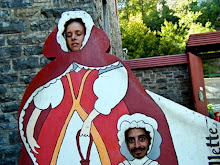The hives, like us, are snowed in! Our friends came along to the farm to help us dig them out. I like to keep the entrances clear for ventilation and the all important 'cleansing flights' (bees don't go to the bathroom until it's warm enough to do so outside.) Each of my hives is set up on a screened bottom board in an attempt to control varroa mites. Other then blocking the entrances, snow is actually a positive asset, as it's a great insulator in these cold temperatures.
Here we are pulling in all our gear through the blizzard:
Ernie waited for us so patiently, tethered to a plow. Adam and Christine who own Blue Heron Farm have recently experienced (yet another) dog attack on their organic chicken flock, so we made sure our friends kept their guy tied tight.
Shoveling and listening to the hives. Some were definitely abuzz, but others were harder to hear. I actually don't hear very well, so when I don't hear anything, I don't lose all hope.
Cleaning the entrances and removing the dead bees, below. Each of these hives went into the Fall with a metal mouse guard, in order to prevent critters from nesting inside. Now that the snow has fallen and everybody has found a spot, the bees are better off with a fully exposed entrance. We did find one mouse guard about 4 feet away from the hive, so we'll see if the bees are hosting any guests in the Spring. This same hive did have a mouse nest last year, but bounced back nicely - what a mess to clean up!
and, here JP is drilling a ventilation hole into one of the hive boxes. Okay, should have been done long ago, but better late than never. Bees can actually maintain really well in low temperatures, but cannot tolerate moisture. Zero ventilation will allow ice to develop, which is a death sentence. I used to just visit the hives around this time and prop the outer cover open with rocks to allow the moisture to escape, but that's a bit risky with animals and wind that could knock the cover off completely.
Now that the hives are shoveled and ventilated it's easy to see how uneven they've become from frost heaves. While this is concerning, it's got nothing on what mud season holds in store. The hives will sink and teeter, and it's pretty scary all around, but that's the deal with the the wet clay on our island.
























Poor bees, I hope they survive. I never thought that there is so much work with them in winter.
ReplyDeleteYou have so much snow!
Best of luck to your bees! I have a hive of wild honey bees up in a 200 year old rock maple next to the house... so glad they are independent! Good you have many hands to help with the effort it takes to care for your bees.
ReplyDeleteFacinating! I always wondered about bee keeping. I could almost feel the cold as you walked to the bees - great post-Gloria
ReplyDeletewe did get a good amount of snow, but nowhere near the 3 feet my sister got 20 minutes south of us - so strange! just to clarify, my willing helpers were only willing since the bees are of no threat right now. usually it is just me, and I would love a beekeeping partner!
ReplyDeleteThis is a wonderful post about what it means to be a beekeeper. I guess you have no bears on the island. We built a tall shed with a big door in the loft on the south wall to foil the bears - and then after many years of tending bees I developed a serious allergy to bee stings - so the bees had to go. Fortunately, there is a good local apiary near by.
ReplyDeleteCW - in fact, we are the only county in Vermont without a bear population! I heard last summer that there was a bear in the northernmost town, but unless that bear swims down, we should be safe. I know most other beekeepers rely on electric fences. We're also lucky to provide plenty of access to water (Lake Champlain) and lots of farm fields; as long as they're not hayed before they bloom!
ReplyDeleteHi there Jp. lovely to get your comment. I am so glad to find your blog and will follow your progress withe the bees this year with great interest. I am just about to start some more bee paintings.. may ask your advice on a few things! I am keeping my fingers crossed for your little workers too..
ReplyDeleteMr Chiots just went out and dug out our hives yesterday. He listened to them and they were humming away. We're hoping they all survive the winter (fingers crossed).
ReplyDeleteWe just lost our last hive to colony collapse disorder...your lovely hives remind me how anxious I am to start anew in the spring with more bees. Kim
ReplyDeletekim, we don't actually have ccd here in vermont which gives everyone a lot to think about. We also don't have industrial monoculture or hives that are moved around a lot, as for almond groves. Hope I didn't just jinx everyone!
ReplyDelete